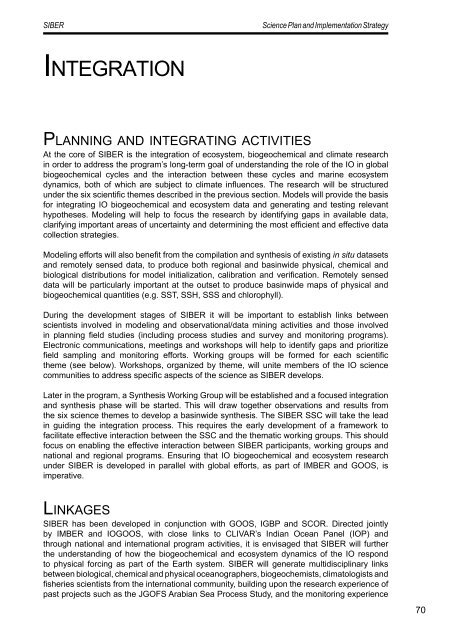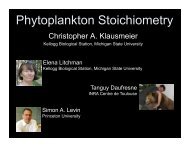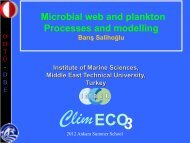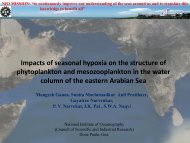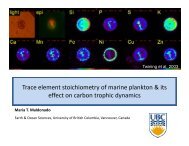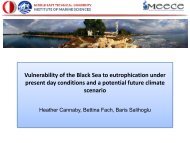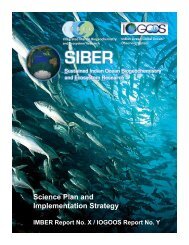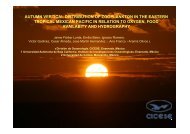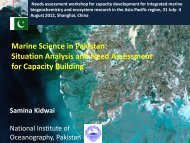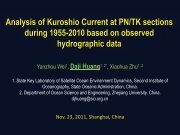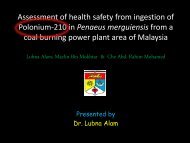SIBER SPIS sept 2011.pdf - IMBER
SIBER SPIS sept 2011.pdf - IMBER
SIBER SPIS sept 2011.pdf - IMBER
Create successful ePaper yourself
Turn your PDF publications into a flip-book with our unique Google optimized e-Paper software.
<strong>SIBER</strong><br />
Science Plan and Implementation Strategy<br />
In t e g r a t i o n<br />
Pl a n n i n g a n d i n t e g r a t i n g a c t i v i t i es<br />
At the core of <strong>SIBER</strong> is the integration of ecosystem, biogeochemical and climate research<br />
in order to address the program’s long-term goal of understanding the role of the IO in global<br />
biogeochemical cycles and the interaction between these cycles and marine ecosystem<br />
dynamics, both of which are subject to climate influences. The research will be structured<br />
under the six scientific themes described in the previous section. Models will provide the basis<br />
for integrating IO biogeochemical and ecosystem data and generating and testing relevant<br />
hypotheses. Modeling will help to focus the research by identifying gaps in available data,<br />
clarifying important areas of uncertainty and determining the most efficient and effective data<br />
collection strategies.<br />
Modeling efforts will also benefit from the compilation and synthesis of existing in situ datasets<br />
and remotely sensed data, to produce both regional and basinwide physical, chemical and<br />
biological distributions for model initialization, calibration and verification. Remotely sensed<br />
data will be particularly important at the outset to produce basinwide maps of physical and<br />
biogeochemical quantities (e.g. SST, SSH, SSS and chlorophyll).<br />
During the development stages of <strong>SIBER</strong> it will be important to establish links between<br />
scientists involved in modeling and observational/data mining activities and those involved<br />
in planning field studies (including process studies and survey and monitoring programs).<br />
Electronic communications, meetings and workshops will help to identify gaps and prioritize<br />
field sampling and monitoring efforts. Working groups will be formed for each scientific<br />
theme (see below). Workshops, organized by theme, will unite members of the IO science<br />
communities to address specific aspects of the science as <strong>SIBER</strong> develops.<br />
Later in the program, a Synthesis Working Group will be established and a focused integration<br />
and synthesis phase will be started. This will draw together observations and results from<br />
the six science themes to develop a basinwide synthesis. The <strong>SIBER</strong> SSC will take the lead<br />
in guiding the integration process. This requires the early development of a framework to<br />
facilitate effective interaction between the SSC and the thematic working groups. This should<br />
focus on enabling the effective interaction between <strong>SIBER</strong> participants, working groups and<br />
national and regional programs. Ensuring that IO biogeochemical and ecosystem research<br />
under <strong>SIBER</strong> is developed in parallel with global efforts, as part of <strong>IMBER</strong> and GOOS, is<br />
imperative.<br />
Li n k a g e s<br />
<strong>SIBER</strong> has been developed in conjunction with GOOS, IGBP and SCOR. Directed jointly<br />
by <strong>IMBER</strong> and IOGOOS, with close links to CLIVAR’s Indian Ocean Panel (IOP) and<br />
through national and international program activities, it is envisaged that <strong>SIBER</strong> will further<br />
the understanding of how the biogeochemical and ecosystem dynamics of the IO respond<br />
to physical forcing as part of the Earth system. <strong>SIBER</strong> will generate multidisciplinary links<br />
between biological, chemical and physical oceanographers, biogeochemists, climatologists and<br />
fisheries scientists from the international community, building upon the research experience of<br />
past projects such as the JGOFS Arabian Sea Process Study, and the monitoring experience<br />
70


